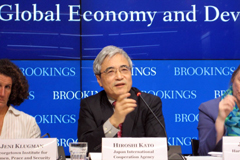Book Launch: Joint Research Project Between JICA-RI and Brookings Looks at Ways for Achieving SDGs
2018.08.10
On July 16 and 18, events were held at the UN headquarters in New York and at the Brookings Institution in Washington D.C. to commemorate the publication of a book titled “From Summits to Solutions: Innovations in Implementing the Sustainable Development Goals.” This book is the outcome of a joint research project between the JICA Research Institute and the Brookings Institution and jointly edited by Hiroshi Kato, senior vice president of JICA. Kato participated in both events with other co-editors.

JICA Senior Vice President Hiroshi Kato, an editor of the book, spoke at the launch event
The joint project has led to the publication of three books on effective foreign aid, and this new book was released as the outcome of the fourth phase. It assesses the implementation of measures that must be taken in order to achieve the Sustainable Development Goals (SDGs) established in 2015 and presents new insights on the trends of foreign aid and its issues. Other editors of the book are Homi Kharas, the interim vice president of the Global Economy and Development program at the Brookings Institution; John McArthur, a senior fellow of the Global Economy and Development program at the Brookings Institution; and Raj M. Desai, a visiting fellow of the Brookings Institution.
On July 18, Kharas started the event by describing the structure of the book. Part I, “Capturing Value,” examines how the SDGs are addressed in market economies and whether they increase corporate incentives. Part II, “Targeting Places,” is about the SDG initiatives related to cities, regions, economic corridors, the ocean, and so on. Part III, “Updating Governance,” addresses who should be responsible in case the SDGs are not achieved.
According to Kharas, numerous stakeholders with different perspectives and ideas are involved in implementing the SDGs, and this book gathers opinions from the diverse perspectives of its 31 authors. Additionally, a study on the level of SDG attainment in 100 countries found that only five of the 25 indicators are likely to achieve 50% or above, suggesting that new initiatives at scale are needed. Kharas argued that the urgency of the situation should be emphasized at a UN High-Level Political Forum in September 2019, and also stressed the importance of accelerating and expanding the implementation of initiatives for achieving the SDGs in each country.
Additionally, Kato, who was one of the panelists on stage, stated that the book contains three important messages, and the first one is about change. There are already many changes happening in the world and those are penetrative, irreversible, and those that form global norms. According to Kato, the fact that the SDGs call for fundamental changes in individual mindsets, behavior, and values is a major point of difference between the Millennium Development Goals (MDGs) and the SDGs. The second important message of the book is to accelerate changes to keep eight billion people out of danger, and the third is the fact that experts in various fields — including government officials, civic groups, aid organizations, and researchers — have already proposed specific, logical solutions for speeding up changes and guiding them in the right direction. Lastly, Kato stated that JICA also needs to increase the speed of SDG implementation and to create bigger impact. He also expressed the desire to promote relationships with the private sector, strengthen partnerships with international development organizations, and utilize ICT and other new technologies.
During the discussions and question sessions, audience and panelists discussed the usefulness of the SDGs in low-income Africa, the function of public-private partnerships, and the methods to be used for evaluating the SDGs.
Both Ryuichi Tomizawa, deputy director general of JICA’s Procurement Department and author of Chapter 9, “Enhancing Statistical Capacity for Development,” and Ikuo Takizawa, deputy director general of JICA’s Human Development Department and author of Chapter 15, “Unity in Diversity: Reshaping the Global Health Architecture,” presented videos that summarized their respective chapters. Please see below for more details.
Chapter 9 “Enhancing Statistical Capacity for Development” outlined by Ryuichi Tomizawa, deputy director general of JICA’s Procurement Department
Chapter 15 “Unity in Diversity: Reshaping the Global Health Architecture” outlined by Ikuo Takizawa, deputy director general of JICA’s Human Development Department

事業事前評価表(地球規模課題対応国際科学技術協力(SATREPS)).国際協力機構 地球環境部 . 防災第一チーム. 1.案件名.国 名: フィリピン共和国.

事業事前評価表(地球規模課題対応国際科学技術協力(SATREPS)).国際協力機構 地球環境部 . 防災第一チーム. 1.案件名.国 名: フィリピン共和国.

事業事前評価表(地球規模課題対応国際科学技術協力(SATREPS)).国際協力機構 地球環境部 . 防災第一チーム. 1.案件名.国 名: フィリピン共和国.

事業事前評価表(地球規模課題対応国際科学技術協力(SATREPS)).国際協力機構 地球環境部 . 防災第一チーム. 1.案件名.国 名: フィリピン共和国.

事業事前評価表(地球規模課題対応国際科学技術協力(SATREPS)).国際協力機構 地球環境部 . 防災第一チーム. 1.案件名.国 名: フィリピン共和国.
scroll